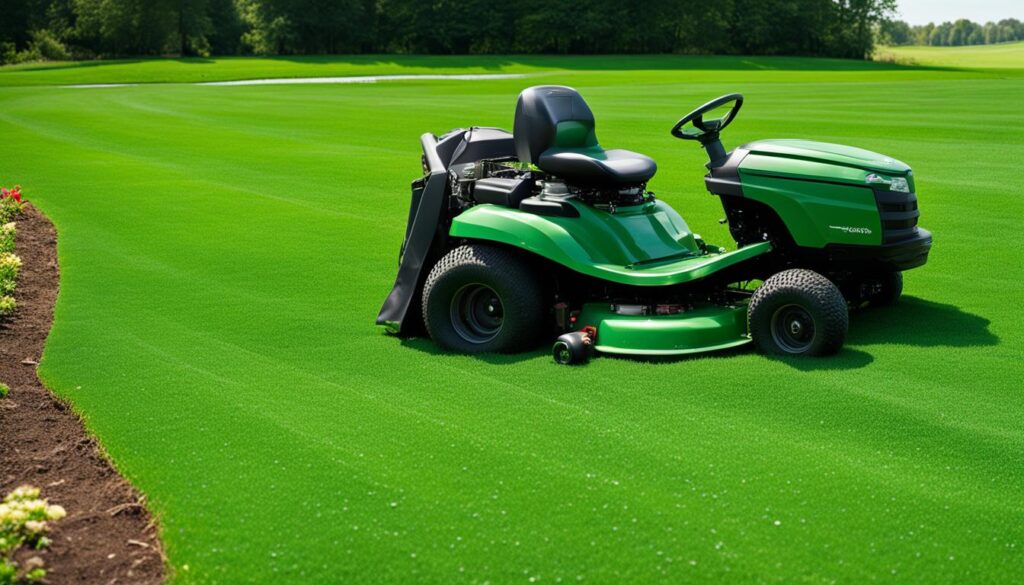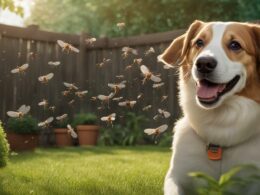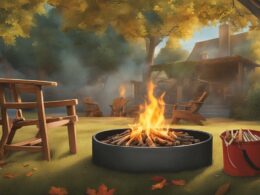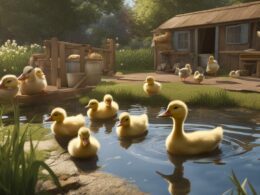When it comes to choosing the best lawn option for your home, the choice between clover and grass is one that many homeowners consider. Both clover and grass have their own unique benefits and drawbacks, making it essential to evaluate which option suits your needs and preferences.
In this article, we will explore the differences between clover and grass lawns, highlighting the advantages and considerations of each. By understanding the key factors, you can make an informed decision about the best lawn choice for your property.
The Benefits of Clover Lawns
Clover lawns offer a range of advantages compared to traditional grass lawns. Whether you’re looking to save time, reduce water usage, or create an eco-friendly space, clover lawns are an excellent choice. Here are the key benefits of having a clover lawn:
- Less water required: One of the major benefits of clover lawns is their water efficiency. Unlike grass lawns that require frequent watering to stay green, clover lawns have a deep root system that allows them to thrive even in drier conditions. This means you can conserve water without compromising the beauty of your lawn.
- Minimal mowing: Say goodbye to spending hours on mowing! Clover lawns have a slower growth rate compared to grass, meaning you’ll need to mow less frequently. This not only saves you time and effort but also reduces noise pollution and fuel consumption.
- Heat tolerance: Clover lawns have excellent heat tolerance, staying lush and green even during the hottest summer months. While grass lawns may turn yellow or go dormant in extreme heat, clover lawns remain resilient and attractive.
- No frequent fertilizers: Forget about expensive fertilizers and complicated feeding schedules. Clover lawns are nitrogen-fixing, which means they have the ability to pull nitrogen from the air and convert it into a usable form for their growth. This natural fertilization process eliminates the need for frequent fertilizer applications.
- Weed suppression without herbicides: Clover lawns possess natural weed-suppressing qualities, outcompeting weeds and preventing their establishment. This reduces or eliminates the need for herbicides, allowing you to maintain a chemical-free lawn.
- Attracts beneficial insects: A clover lawn acts as a magnet for beneficial insects such as bees and butterflies. These pollinators play a crucial role in supporting ecosystems and help with the reproduction of plants. By choosing a clover lawn, you’re helping to promote biodiversity and create a habitat for these essential creatures.
- Affordable seed: Starting a clover lawn won’t break the bank. Clover seeds are generally more affordable than grass seeds, making it a cost-effective option for lawn establishment. You can have a beautiful and environmentally friendly lawn without spending a fortune.
- Minimizes the need for aeration: Clover lawns have robust root systems that naturally aerate the soil, reducing the need for mechanical aeration. This deep root structure also improves soil health and helps prevent compaction, allowing for better water infiltration.
- Tolerates shade: If you have areas in your yard that receive limited sunlight, clover lawns are an excellent choice. They tolerate shade better than grass, maintaining their vigor and appearance even in partially shaded areas.
With all these benefits, it’s no wonder that clover lawns are gaining popularity among homeowners. They provide an array of advantages while contributing to a greener and more sustainable environment for you and your family.
Types of Clover for Your Lawn
When considering clover for your lawn, there are several varieties to choose from. The most popular types of clover for lawns include white clover, red clover, and microclover.
White clover: White clover is a well-known option and is often used in lawn mixes. It is a low-growing clover variety that forms a dense mat, effectively outcompeting and suppressing weeds. Its ability to fix nitrogen from the air enhances soil fertility, making it an excellent choice for lawns.
Red clover: Red clover adds a splash of color to your lawn with its beautiful reddish-purple flowers. Unlike white clover, red clover grows taller and has a more upright growth habit. It is often mixed with other grasses and provides additional benefits such as attracting pollinators to your lawn.
Microclover: Microclover is a newer variety that has gained popularity due to its small leaves and ability to blend seamlessly with other grasses. It forms a dense turf and has a similar appearance to regular grass. Microclover is an excellent choice for those who prefer a more subtle clover presence in their lawn.
When choosing which clover variety to include in your lawn, consider factors such as growth habit, appearance, and your specific preferences. Each type of clover brings its own unique benefits to your lawn, so select the one that aligns best with your desired outcome.
Clover Versus Grass: Watering and Mowing Comparison
When it comes to maintaining a lush and healthy lawn, the amount of water and the frequency of mowing required can significantly impact your yard’s appearance and your overall effort. In this section, we will compare clover lawns with traditional grass lawns in terms of watering and mowing, helping you make an informed decision based on your needs and preferences.
Watering:
Clover lawns require less water compared to traditional grass lawns. This is mainly due to the deep root system of clover, which enables it to access moisture from deeper soil layers. As a result, you’ll spend less time and effort watering your lawn, contributing to water conservation efforts and reducing your utility bills.
Mowing:
One of the key advantages of clover lawns is their reduced mowing needs. Unlike turfgrasses that often demand frequent trimming, clover lawns can thrive with less mowing. In fact, allowing the clover to grow longer can create a charming meadow-like appearance, adding a natural aesthetic to your outdoor space.
However, occasional mowing is still necessary to keep your clover lawn neat and manageable. By mowing before the first frost sets in, you can prepare your lawn for winter and ensure healthy regrowth in the following spring.
With the reduced watering requirements and lower mowing frequency of clover lawns, you have the opportunity to save valuable time and resources while maintaining a beautiful and eco-friendly outdoor space.
Clover Versus Grass: Heat Tolerance and Fertilization Comparison
When it comes to heat tolerance, clover outperforms grass, ensuring a lush green lawn throughout the scorching summer months. While some turfgrasses go dormant and turn yellow under extreme heat, clover remains resilient and vibrant. Its ability to withstand high temperatures makes it an ideal choice for those living in hot climates or regions with long summers.
What sets clover apart from grass is its remarkable ability to fix nitrogen. Unlike turfgrasses, clover can draw nitrogen from the air and convert it into a form that it can use for growth. This not only provides the necessary nutrients for clover itself but also benefits nearby plants. As a result, clover doesn’t require frequent fertilizer applications like grass does. This natural ability to self-fertilize not only saves you money on fertilizers but also reduces the need for chemical-based products that can harm the environment.
Whether you opt for a full clover lawn or a clover-to-grass blend, the benefits of decreased fertilizer use remain the same. By allowing clover to thrive alongside grass, you can eliminate the need for excessive fertilization, resulting in a healthier and more sustainable lawn. Plus, the vibrant green of the clover juxtaposed with the grass creates an attractive visual appeal.
As you consider the heat tolerance and fertilization requirements of your lawn, choosing clover over grass can be a wise decision. Its heat tolerance ensures a beautiful lawn even in extreme temperatures, while its nitrogen-fixing capacity eliminates the need for frequent fertilization. By adopting a clover-based lawn, you’re not only reducing the maintenance workload but also contributing to a greener and more sustainable environment.
Clover Versus Grass: Herbicides and Pesticides Comparison
When it comes to the battle between clover and grass, there is one area where clover clearly takes the lead – herbicides and pesticides. Unlike grass, clover has a natural ability to suppress weeds and prevent pests without the need for chemical interventions. Clover is a rapid spreader with dense roots that effectively smother broadleaf weeds, keeping your lawn weed-free without the use of herbicides.
It’s important to note that using broadleaf herbicides on clover can cause damage, so it’s best to avoid them altogether. Instead, let the clover work its magic in naturally controlling weeds. Additionally, clover lawns have another advantage – they attract beneficial insects that prey on pests. This creates a natural balance within your lawn, reducing the need for synthetic pesticides that can be harmful to humans, pets, and the environment.
By choosing clover over grass, you not only eliminate the need for herbicides and pesticides, but you also create a healthier and more sustainable lawn that benefits both you and the ecosystem.
Clover Versus Grass: Cost and Maintenance Comparison
When it comes to the cost and maintenance of your lawn, clover provides a budget-friendly and low-maintenance alternative to traditional grass. Not only is clover seed less expensive compared to grass seed, but clover lawns also require minimal upkeep, saving you both time and money.
Unlike grass lawns that often demand frequent watering, clover is more drought-tolerant and requires less water to stay green and healthy. This not only reduces your water bill but also conserves a precious resource. Additionally, with clover’s natural ability to fix nitrogen, it eliminates the need for regular fertilization, further reducing maintenance costs and the use of potentially harmful chemicals.
Clover lawns also provide the advantage of reduced mowing. While grass lawns typically require regular mowing to maintain their appearance, clover grows at a slower pace and can be left to grow longer, giving your yard a beautiful meadow-like aesthetic. By reducing the frequency of mowing, you can save time, energy, and resources, making clover an attractive option for those seeking a low-maintenance lawn.
Furthermore, clover lawns eliminate the need for aeration, a common practice for maintaining healthy grass lawns. The dense root system of clover naturally aerates the soil, promoting good drainage and overall lawn health. This means fewer maintenance tasks for you and a healthier, more sustainable lawn.
In addition to its cost-saving and low-maintenance benefits, clover lawns attract beneficial insects such as bees and butterflies. These insects play a crucial role in pollination and contribute to the overall health of your garden. By opting for a clover lawn, you can create a welcoming habitat for these beneficial creatures, promoting a more eco-friendly and sustainable environment.
In summary, when comparing the cost and maintenance of clover versus grass, clover proves to be an affordable and low-maintenance choice. With its inexpensive seed, reduced watering and mowing requirements, elimination of aeration needs, and attraction of beneficial insects, clover lawns provide a sustainable and eco-friendly alternative to traditional grass lawns. Consider the benefits of clover and make an informed decision for a beautiful and hassle-free lawn.
– Which is Better for a Beginner Gardener: Clover or Grass?
For a beginner gardener, clover may be a better option than grass, as it requires less maintenance and is more drought-resistant. However, if you’re looking to add some color to your garden, consider planting the easiest roses for beginners, which can add beauty and fragrance with minimal effort.
Conclusion
When it comes to choosing between clover and grass for your lawn, it’s essential to consider the benefits and drawbacks of each option. Clover offers numerous advantages, including water and time savings, heat tolerance, natural weed and pest prevention, cost-effectiveness, and environmental benefits. It requires less water and mowing, stays green during heatwaves, suppresses weeds, attracts beneficial insects, and eliminates the need for frequent fertilization or herbicides/pesticides.
However, it’s important to note that clover may not be suitable for high-traffic areas, heavily shaded lawns, cold/arid climates, or individuals with bee sting allergies. Grass, on the other hand, is generally more resilient and better suited for heavily used spaces. It’s important to consider these factors when making your decision.
In conclusion, the best lawn choice ultimately depends on your specific needs and preferences. If you value water conservation, low maintenance, and a more eco-friendly option, clover may be the ideal choice for you. However, if you have specific requirements such as heavy foot traffic or shaded areas, grass might be a more suitable option. Consider the pros and cons carefully to make an informed decision that aligns with your lawn goals.










